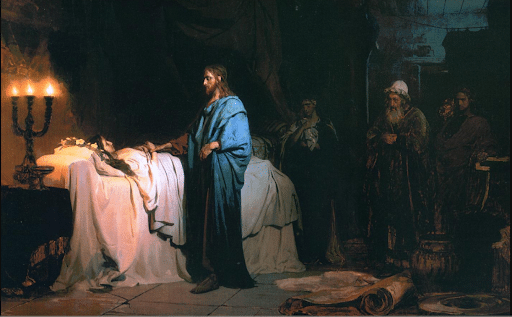Today’s author is Prince of Peace member, Scott Tunseth.

This week we explore two healing stories in chapter 5 of the Gospel of Mark. Things happen fast in Mark’s Gospel. We have already seen Jesus heal five other people, including last week’s casting out a legion of demons from a man in gentile territory, east of the Sea of Galilee. In today’s stories Jesus has crossed the sea again and is back in Galilee, in heavily Jewish territory. A local synagogue leader named Jairus seeks out Jesus, falls on his knees before him (just as the man with an unclean spirit did) pleading with him to heal is sick daughter. Followed by a large crowd, Jesus agrees to go to Jairus’ home.
Along the way, a woman who has been suffering with a flow of blood for twelve years pushes her way through the crowd to touch Jesus’ cloak, believing that simply touching Jesus will be enough to make her well. And she was right. Immediately, her flow of blood stops. Jesus knows something has happened and asks who has touched his cloak. The woman comes forward and also falls on her knees before him, confessing to him what she had done. Jesus said to her, “Daughter, your faith has made you well.”
While this is happening someone arrives to tell Jairus that his daughter has died. Overhearing this, Jesus tells Jairus not to worry, but believe. Jesus goes to the house, takes the dead child by the hand, and she awakes and begins to walk about. Then Jesus does something he often does in Mark: “He strictly ordered them that no one should know this.”
It’s no wonder that Jesus is drawing crowds and all sorts of attention. Is there anything more dramatic than an exorcism, healing, or bringing a dead person back to life? To say nothing of commanding storms to cease. Jesus is a true miracle worker and the embodiment of God’s restorative power.
Miracle working. Faith healing. Resurrecting the dead. The Bible, both Old and New Testaments, are filled with such stories. I suppose one can argue that Jesus did heal all manner of physical disease and sickness, but physical healing was secondary to his ministry of spiritual restoration. Even so, these stories of physical healing raise both hopes and questions. For example, do faith healers and healings really exist today? And what are the connections between physical, mental, and spiritual health?
Some of what looks like faith healing today is really a sham. For example, televangelist Peter Popoff claimed he could tell what conditions people suffered just by looking at them, but in reality, before each show his wife and other assistants went through the crowd talking with people about their concerns and taking notes. When Popoff came on stage he had a tiny earpiece through which his wife would rely critical information about the people who came forward for healing, so it looked like Popoff had miraculous knowledge.
And then there are those who deny modern medical treatment and rely only on prayer to treat illnesses, both mild and severe. We’ve heard stories of adults and children dying from ailments that could have been treated medically with relative ease. Sometimes our secular courts have stepped in to order treatment in such cases.
I have no doubt that Jesus had the power to heal, a power he passed on to his disciples, who also exercised healing power. I suppose it’s natural that some modern-day believers (Christ followers) would claim the same sort of power. The Apostle Paul talks about the spiritual “gift of healing” (1 Cor 12:9). While I am skeptical of many healers who seem to make a living from their very public healing ministry, I also leave room for the power of God’s Spirit to act in miraculous ways. And I am very thankful also for the progress that has been made in medical and psychotherapeutic treatments of all kinds. I can refer to these as miracles too.
There is a greater truth in these stories, I think. Commenting on these passages, preaching professor Emerson Powery asks, “Can the Christian community alter the conditions of people’s lives? Can it, too, bring healing into troubled circumstances? Must it not also cross boundaries [as Jesus did]—whether they are related to ethnicity, gender, race, sexual orientation, politics, or any other boundaries that divide our society—and advocate life-giving meaning and change? May God grant us courage to do so.” (Working Preacher, July 1, 2012)
Faith healing is not only about changing the physical trajectory of illness; it is also about the faithful (that’s us) bringing healing and restoration wherever it is needed in this world.
When pain of the world surrounds us with darkness and despair,
When searching just confounds us with false hopes everywhere,
When lives are starved for meaning and destiny is bare,
We are called to follow Jesus and let God’s healing flow through us. (ELW 704)